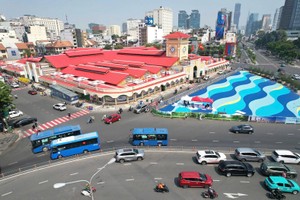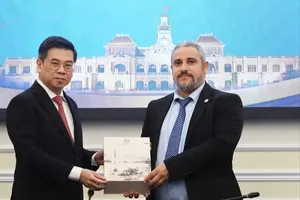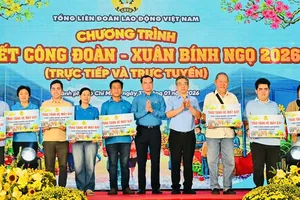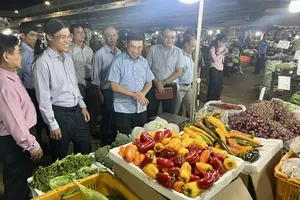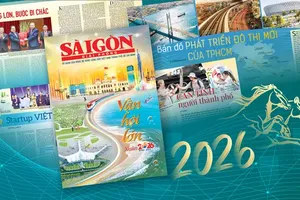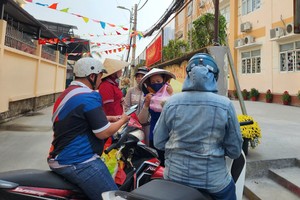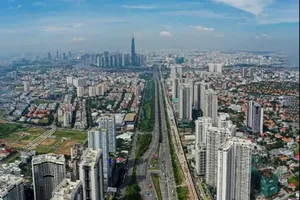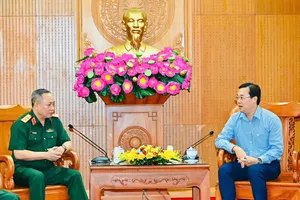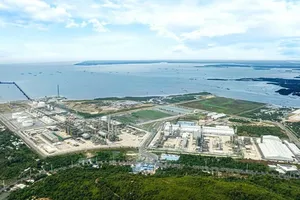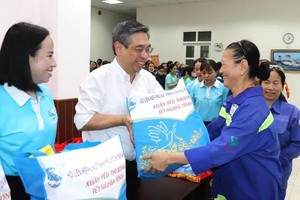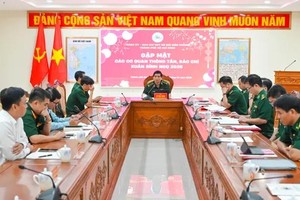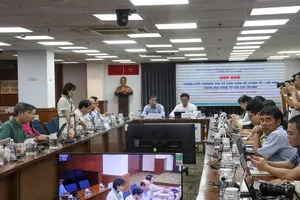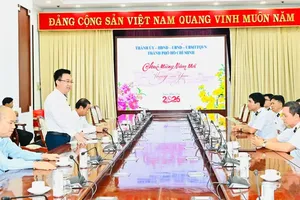Attending the meeting were Standing Vice Chairman of the Ho Chi Minh City People’s Committee, Nguyen Van Tho; Vice chairmen of the municipal People’s Committee, including Nguyen Loc Ha, Nguyen Manh Cuong, Bui Xuan Cuong, and Nguyen Van Dung.
Several sectors and industries maintain positive growth momentum
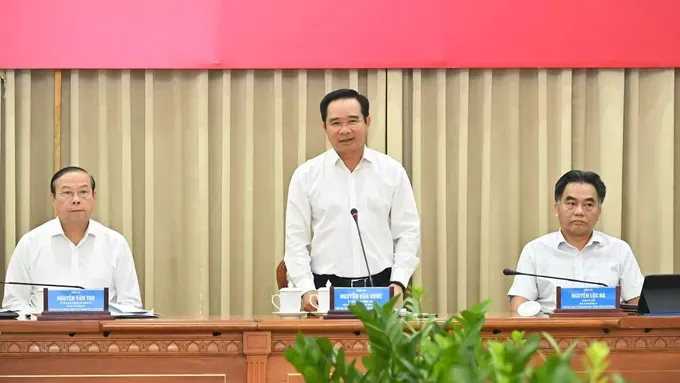
Speaking at the conference, Chairman of the Ho Chi Minh City People’s Committee, Nguyen Van Duoc, called on delegates to focus their discussions on the city’s current socio-economic situation, contribute input to the draft documents for the upcoming 2025–2030 term Party Congress of the Ho Chi Minh City Party Committee, and review support policies for officials, public servants, and workers affected by organizational restructuring.
Regarding the city’s socio-economic performance in July and the first seven months of 2025, Director of the Ho Chi Minh City Department of Finance, Nguyen Cong Vinh, reported that the municipal People’s Committee has prioritized streamlining and restructuring its administrative apparatus while implementing the two-tier local government model in a timely and effective manner, in line with set targets.
He noted that the city has actively rolled out key resolutions in areas such as science and technology, international integration, legal development, private sector growth, and solutions to promote economic growth in accordance with the conclusions set out in Resolution 123 of the Party Central Committee. These efforts have yielded positive results, helping to drive growth in several key sectors.
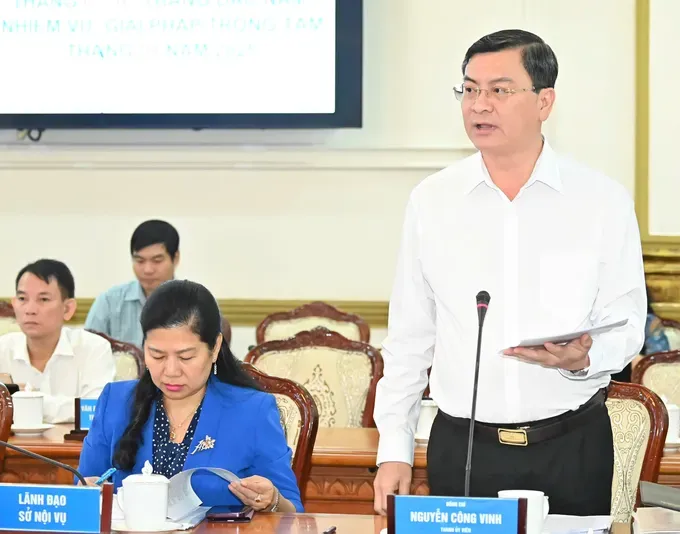
Specifically, total state budget revenue in the first seven months of 2025 reached VND472.59 trillion (US$18 billion), equivalent to 70.4 percent of the annual target set by the central government and 114.6 percent of the figure recorded during the same period last year.
Local budget expenditure during the same period amounted to VND98.29 trillion (US$3.8 billion), or 34.8 percent of the full-year allocation. As of the end of July, the city had disbursed VND47.58 trillion (US$1.82 billion) in public investment, fulfilling 40 percent of the capital plan assigned by the Prime Minister and 31.4 percent of the capital plan approved by the city.
Tourism revenue in July was estimated at VND22.37 trillion (US$855 million), representing a 45.6 percent increase compared to July 2024. Cumulatively, tourism revenue for the first seven months reached an estimated VND140.31 trillion (US$5.4 billion), up 29.9 percent year-on-year and achieving 54 percent of the annual target.
Retail sales and consumer service revenue in July were estimated at VND159.95 trillion (US$6.1 billion), marking a 14.7 percent increase compared to the same period last year. Notably, the travel and tourism sector continued to stand out with robust growth, generating estimated revenue of VND5.99 trillion (US$229 million), up 32.8 percent year-on-year.
Over the first seven months, total retail sales and consumer service revenue surpassed VND1 trillion (US$38.2 billion), representing a 15.5 percent increase compared to the same period in 2024.
Tourism revenue in July is estimated at VND22.37 trillion (US$855.3 million), marking a 45.6 percent increase compared to the same period in 2024. Cumulatively, tourism revenue for the first seven months reached an estimated VND140.31 trillion (US$5.4 billion), up 29.9 percent year-on-year and achieving 54 percent of the annual target.
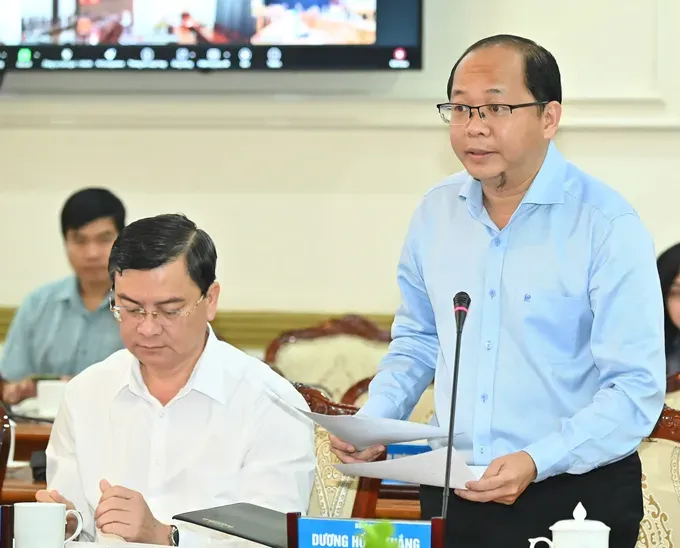
According to the Director of the Department of Finance of the city, the notable growth in July reflects the city’s positive industrial recovery and development amid global economic fluctuations. The key and traditional industries have recorded significant growth, demonstrating the effectiveness of the city's support policies and industrial development strategies.
As of the end of July, Ho Chi Minh City attracted approximately US$6.19 billion in investment capital, combining both newly registered investment certificates and capital raised through equity contributions, share purchases, and buybacks of domestic enterprises. This represents a 45.6 percent increase compared to the same period in 2024.
Among these, a total of 1,073 new foreign investment projects were granted investment registration certificates with a total registered capital exceeding US$1.29 billion.
Additionally, 296 projects licensed in previous years adjusted their investment capital, resulting in an increase of US$2.37 billion. The city also approved 1,323 cases of foreign investors contributing capital, purchasing shares, or buying back equity stakes in domestic enterprises, with a total registered capital of approximately US$2.52 billion.
Additionally, Ho Chi Minh City resolved obstacles for 86 projects valued at over VND420 trillion (US$16 billion), covering a total area of around 1,200 hectares.
Focusing on implementing measures to ensure growth
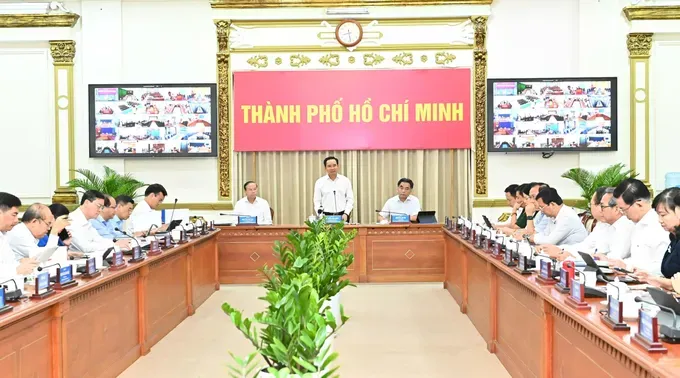
The Ho Chi Minh City People’s Committee has outlined a series of key tasks and measures for August. Specifically, it will continue to vigorously and cohesively implement growth targets across various sectors and localities, alongside priority tasks and solutions aimed at ensuring the national economic growth reaches 8.3–8.5 percent in 2025.
The city will continue to implement plans for the reorganization and restructuring of administrative units at all levels, alongside the establishment of the two-tier local government model. Priority will be given to accelerating growth-promoting measures, while proactively and flexibly responding to emerging issues with timely and effective policies. The city remains steadfast in its goal of achieving the 2025 GRDP growth target and is committed to effectively executing the Party Central Committee's Conclusion No. 123-KL/TW aiming for double-digit economic growth, exceeding its assigned 8.5 percent target.
Simultaneously, the city will focus on removing obstacles for projects, accelerating key initiatives and public investment disbursement, infrastructure development, and effectively attracting social resources. Efforts will be intensified in planning and constructing infrastructure, developing transportation systems to reduce congestion and traffic accidents, promoting social housing, and addressing houses situated along and near canals. The city will also strengthen management and efficient use of natural resources while implementing comprehensive measures for environmental pollution prevention and control.
In addition, the city will pursue stronger and more substantive administrative reforms to remove obstacles for production and business activities, thereby enhancing the economy’s competitiveness. Focus will be placed on the development of science and technology, innovation, emerging industries, and the promotion of comprehensive digital transformation.
The city is committed to effectively and promptly implementing social welfare policies and improving the quality of public healthcare services, with a strong focus on education and training. Efforts will continue to enhance information and communication work, particularly policy communication to inspire, motivate, and foster social consensus and a renewed spirit for development. The city also aims to ensure national defense, security, social order, and safety, while intensifying the fight against corruption, negativity, and wastefulness.


